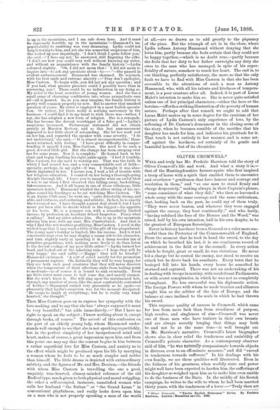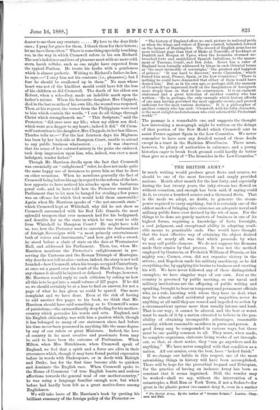OLIVER CROMWELL.*
WELL and truly has Mr. Frederic Harrison told the story of Oliver Cromwell's life and work. And what a story it is,— that of the Huntingdonshire farmer-squire who first inspired a troop of horse with a spirit that enabled them to encounter and overthrow "gentlemen that have honour and courage and resolution in them," and "as one man to stand firmly and charge desperately," making always, in their Captain's phrase, "some conscience of what they did ;" who then so leavened a whole army with the same courage and the same enthusiasm, that, looking back on the past, he could say of them truly, "They were never beaten, and wherever they were engaged against the enemy, they beat continually ;" and who, lastly, "having subdued the foes of the Houses and the Word," was raised, half by his own intention, half in his own despite, to be the greatest of European Sovereigns.
Never in history has there been a General or a ruler more suc- cessful than the Protector of the Commonwealth of England. From the moment that he took in hand the sword, to the day on which he breathed his last, it is one continuous record of achievement in the field or in the council. In every action which he fought, great or small, he was victorious. He never led a charge but he routed the enemy, nor stood to receive an attack but he drove back his assailants. Every town that he besieged fell into his hands, every house he assaulted he stormed and captured. There was not an undertaking of his in dealing with troops in mutiny, with recalcitrant Parliaments, or with secret conspiracies, in which he was not as completely triumphant. No less successful was his diplomatic action. The foreign Powers with whom he made treaties and alliances sought him as the arbiter of the fate of Europe, and the balance at once inclined to the scale in which he had thrown his sword.
This supreme quality of success in Cromwell, which came far less from mere luck than from steadiness of purpose, high resolve, and singleness of aim—Cromwell was never one of those men who have traitors in their own breasts and are always secretly longing that things may both be and not be at the same time—is well brought out in Mr. Harrison's narrative. Cromwell's latest biographer shows also in clear relief the tenderness and amiability of Cromwell's private character. As a contemporary observer said of him, "he was naturally compassionate towards objects in distress, even to an effeminate measure," and did "exceed in tenderness towards sufferers." In his dealings with his own family, we see these qualities well illustrated. Even in the fullness of his greatness, when worldly state and power might well have been expected to harden him, the sufferings of his daughter so weighed upon him as to make him even unable to do the business of the State. In the middle of his Scotch campaign, he writes to the wife to whom he ha a been married thirty years, with the tenderness of a lover:—" Truly thou art
• Oliver Cromwell. "Twelve English Statesmen" Series. By Frederic Harrison. London: HaomilLan and Co. 1888.
dearer to me than any creature My love to the dear little ones ; I pray for grace for them. I thank them for their letters ; let me have them often.' There is something specially touching, too, in the way in which Cromwell refers to his son Richard. The son's indolence and love of pleasure meet with no mere cold, stern, harsh rebuke, such as one might have expected from the typical Puritan. He treats his faults with a gentleness which is almost pathetic. Writing to Richard's father-in-law, he says :—" I envy him not his contents [i.e., pleasures]; but I fear he should be swallowed up in them." No man whose heart was not of the kindliest mould could have felt the loss of his children as did Cromwell. The death of his eldest son Robert, when a schoolboy, made an indelible mark upon the father's nature. When his favourite daughter, Mrs. Claypole, died in the last months of his own life, the wound was reopened. Then, at his request, the verses from the Philippians were read to him which contain the words, "I can do all things through Christ which strengtheneth me." "This Scripture," said the Protector, "did once save my life; when my eldest son died; which went as a dagger to my heart ; indeed it did." Of Crom- well's attention to his daughter, Mrs. Claypole, in her last illness, Thm-loe tells us :—" For the last fourteen days his Highness has been by her bed-side at Hampton Court, unable to attend to any public business whatsoever It was observed that his sense of her outward misery in the pains she endured, took deep impression upon him, who, indeed, was ever a most indulgent, tender father."
Though Mr. Harrison dwells upon the fact that Cromwell was essentially an " enlightened " ruler, he does not make quite the same happy use of instances to prove him so that he does on other occasions. When he mentions generally the fact of Cromwell being before his age in regard to the reform of the law, how apposite to have noticed his attacks upon the barbarous penal code, and to have told how the Protector warned his Parliament that to let men be hanged for stealing a few pence was an offence for which God would hold them answerable !
Again, when Mr. Harrison speaks of "the not-uncouth state" which Cromwell kept at Whitehall, why did he not show us Cromwell surrounded with his Red Life Guards, the most splendid troopers that ever monarch had for his bodyguard, and: describe for us the state in which he was wont to ride from Whitehall to Hampton Court ? He might have told us, too, how the Protector used to entertain the Ambassadors of foreign Sovereigns with "a most princely entertainment both of voices and instruments," and how, girt with a sword, he stood before a chair of state on the dais at Westminster Hall, and addressed his Parliament. Then, too, when Mr.
Harrison mentions the Protector's enlightenment in pre- serving the Cartoons and the Roman Triumph of Mantegna, why does he not tell us also—unless, indeed, the story is not well founded—how Cromwell, when his troops occupied Canterbury, at once set a guard over the tomb of the Black Prince, lest by any chance it should be injured or defaced. Perhaps, however, Mr. Harrison would reply to such criticism by asking us how all this is to be got into a small volume of 227 pages. If he did so, we should certainly be at a loss to find an answer, for not a page of what he has given us could be spared. One more domplaint and we have done. Even at the risk of having to add another five pages to his book, we think that Mr.
Harrison should have said something as to Cromwell's sense of patriotism,—the extraordinarily deep feeling for his mother.. country which pervades his words and acts. England, and his English citizenship, was with him a passion which, though it has belonged to many of our statesmen since, had before his time never been possessed in anything like the same degree by any of our rulers or great Ministers. Indeed, the love of country in its most creative and passionate form may be said to have been the outcome of Puritanism. When Milton, when Mrs. Hutchinson, when Cromwell speak of England, we feel that a spirit and a force are alive in their utterances which, though it may have fount partial expression before in words with Shakespeare, or in deeds with Raleigh and Drake, has for the first time become able to quicken and dominate the English race. When Cromwell spoke to the House of Commons "of true English hearts and zealous affections towards the general weal of our mother-country," he was using a language familiar enough now, but which before had hardly been felt as a great motive-force among Englishmen. We will take leave of Mr. Harrison's book by quoting his brilliant summary of the foreign policy of the Protector " The history of England offers no such picture to national pride as when the kings and rulers of Europe courted, belauded, fawned on the farmer of Huntingdon. The record of English arms has no more brilliant page than that of Blake at Teneriffe, of Lockhart at Dunkirk and Morgan at Ypres, when the Ironsides stormed un- breached forts and annihilated Spanish battalions, to the amaze- ment of Turenne, C,ond6, and Don John. Never has a ruler of England been formally addressed by kings in such Oriental terms as 'the most invincible of sovereigns," the greatest and happiest of princes." It was hard to discover,' wrote Clarendon, which feared him most, Prance, Spain, or the Low Countries;' ' There is nothing he could have demanded that either of them would have denied him.' But, as in his own age, so perhaps still, the memory of Cromwell has impressed itself on the imagination of foreigners more deeply than on that of his countrymen. It is an eminent statesman and a great historian of another country who has written : He is, perhaps, the only example which history affords. of one man having governed the most opposite events, and proved sufficient for the most various destinies.' It is a philosopher of another country who has said : 'Cromwell, with his lofty character, is the most enlightened statesman who ever adorned the Protestant world.'" The passage is a remarkable one, and suggests the thought how interesting a monograph might be written on the doings. of that portion of the New Model which Cromwell sent to assist France against Spain in the Low Countries. We never remember to have seen any detailed record of these deeds. except in a tract in the Harleian Miscellanies. There must, however, be plenty of authorities in existence, and a young historian eager to break fresh ground could hardly do better than give us a study of "The Ironsides in the Low Countries.'



































 Previous page
Previous page